新版八年级上册读书笔记总结
优秀读书笔记8篇八年级上册

优秀读书笔记8篇八年级上册优秀读书笔记八年级上册人的一生中,读书就像是一种修行,可以给我们带来无尽的乐趣和启发。
在八年级上册的课程中,我看到了许多优秀的读书笔记,它们以不同的形式和结构展现了作者对书籍的理解和感悟。
在这篇读后感中,我将分享八年级上册中的八篇优秀读书笔记,并逐一分析和讨论它们。
第一篇读书笔记是关于《西游记》的,作者通过对孙悟空的分析,探讨了人性的复杂性和成长的重要性。
他指出,孙悟空的天赋和勇气并不是他成为一名真正的英雄所必需的,相反,他的成长是通过一次又一次的磨练和奋斗实现的。
这篇读书笔记深入剖析了孙悟空的性格转变和他对旅程的理解,给了我很大的启示,让我明白了成长的道路上付出和努力的重要性。
第二篇读书笔记是关于《红楼梦》的,作者从一个女性的角度出发,对作品中的女性形象进行了深入的探讨。
她认为,虽然这些女性的命运注定是悲剧的,但她们的坚强和智慧使她们能够在困境中保持尊严和自尊。
这篇读书笔记给了我很多思考:“女性的力量和智慧究竟来自哪里?”,“我们如何在现实生活中保持自己的尊严?”。
我相信这些问题将在我的生活中起到指导性的作用。
第三篇读书笔记是关于《钢铁是怎样炼成的》的,作者通过对主人公帕维尔·科察格诺夫的成长经历的分析,强调了坚持和奋斗的重要性。
他指出,帕维尔在困境中通过坚持不懈的努力和不屈不挠的精神克服了一切困难。
这篇读书笔记让我明白了成功的背后往往需要付出艰辛的努力和坚持不懈的精神,启发了我在学习和生活中不断努力的决心。
第四篇读书笔记是关于《孤独的星球》的,作者通过对自然环境的描述和对孤独的思考,表达了对自然的崇敬和对人类的关注。
他指出,我们应该珍惜自然的美丽和宝贵的资源,同时也应该尊重人类的多样性和对自由的追求。
这篇读书笔记让我重新认识了我们与自然的关系,也让我明白了人类在探索自由和幸福的道路上应该保持谦卑和大胆的信念。
第五篇读书笔记是关于《水浒传》的,作者通过对一系列英雄人物的分析,强调了团结和合作的重要性。
优秀读书笔记6篇八年级上册

优秀读书笔记6篇八年级上册《优秀读书笔记6篇八年级上册》一、《红楼梦读后感》《红楼梦》是我读过的一本震撼人心的小说,它的细腻描写、丰富的人物刻画和深刻的情感揭示让我陶醉其中。
书中反映了封建社会的虚荣、堕落以及家族的沉沦,给我留下了深刻的印象。
在《红楼梦》中,作者以细腻的笔触勾勒出了众多丰满的人物形象,每个角色都有自己独特的性格和命运。
贾、史、王、薛四大家族的兴衰变迁,展现了封建社会家族观念和命运的无常。
书中的贾宝玉、林黛玉、薛宝钗等人物形象栩栩如生,他们的内心世界和情感纠葛,让人为之动容。
通过阅读《红楼梦》,我深刻认识到封建社会的虚伪和矛盾。
封建家族的权力斗争和利益争夺,让我感受到了现实社会中的无奈和残酷。
书中对贾宝玉追求真知灼见,追求自由的描写,更是让我思考了人生的意义和价值。
二、《西游记读后感》《西游记》是一部描写唐僧师徒四人西天取经的神话小说,它通过一系列的冒险和奇遇,展现了人性的善恶、修行的艰辛和友情的可贵。
故事中的唐僧师徒四人身负重任,踏上了险象环生的西天取经之路。
他们经历了无数的艰辛和危险,但始终坚持着信仰和善良。
每个人物都有自己的特点和命运,师徒之间的友情更是让人感动。
其中孙悟空的机智勇敢、猪八戒的憨厚可爱、沙和尚的稳重聪明,给我留下了深刻的印象。
通过阅读《西游记》,我深刻理解到修行的艰辛和意义。
唐僧师徒四人在每个困难和挫折面前都没有放弃,他们不断修正自己的错误,提升自己的修行水平。
这给我启示:人生的道路充满了艰辛,只有不断修行和提升自己才能克服困难,实现自己的目标。
三、《水浒传读后感》《水浒传》是一部描写宋江等梁山好汉起义抗金的英雄史诗。
小说中的每个人物都具有突出的个性和独特的命运,通过他们的生活经历和对立矛盾,展现了人性的复杂和社会的不公。
故事中的宋江等梁山好汉是被社会所压迫的,他们因为各种原因落草成寇,最后成为了抗金义军。
他们的行为在一定程度上反映了封建统治下社会的不公和人民的苦难。
八年级上册《蓝天照耀中国》读书笔记6篇

八年级上册《蓝天照耀中国》读书笔记6篇1.笔记一:书籍概述蓝天照耀中国》是八年级上册的一本地理教科书,全书分为六个章节,共涵盖了我国的自然地理、人文地理及其与经济发展的关系。
这本教科书以生动有趣的语言和图像,带我们深入了解中国的地理特点和丰富的资源。
2.笔记二:自然地理第一章节主要介绍了中国的自然地理特点。
中国地域广阔,地貌复杂多样。
我们国家拥有广袤的平原、高山、河流等自然地理资源。
同时,研究了我国的气候变化,包括四季变化、___和气候带等知识。
这些内容使我更加了解了中国独特的自然环境。
3.笔记三:人文地理第二章节主要介绍了中国的人文地理特点。
中国是一个多民族国家,拥有悠久的历史和丰富的文化遗产。
在这一章节中,我了解了中国各个地区的不同民族、语言和宗教。
人文地理的研究帮助我更好地认识了中国的多样性。
4.笔记四:资源与经济发展第三章节主要介绍了中国的资源与经济发展关系。
中国拥有丰富的自然资源,如煤炭、铁矿石和石油等。
这些资源的开发和利用对中国的经济发展起到了重要的支撑作用。
研究了这一章节,我对中国的资源优势和经济发展有了更深刻的理解。
5.笔记五:地理信息技术第四章节主要介绍了地理信息技术在中国的应用及其对社会发展的影响。
地理信息技术是一门利用计算机技术来收集、管理和展示地理数据的学科。
研究了这一章节,我认识到地理信息技术对于城市规划、交通管理和环境保护等方面的重要性。
6.笔记六:环境保护与可持续发展第五章节主要介绍了中国的环境保护与可持续发展。
中国是世界上人口最多的国家之一,过度的工业化和城市化给生态环境带来了巨大的压力。
研究了这一章节,我了解到中国政府采取了一系列的环境保护措施,以及如何实现可持续发展。
总结通过八年级上册《蓝天照耀中国》的学习,我对中国的地理特点、人文地理、资源与经济发展、地理信息技术、环境保护以及可持续发展有了更深入的了解。
这本教科书不仅带给我知识,还激发了我对中国地理的兴趣。
八年级读书笔记(精选15篇)

八年级读书笔记(精选15篇)(实用版)编制人:__________________审核人:__________________审批人:__________________编制单位:__________________编制时间:____年____月____日序言下载提示:该文档是本店铺精心编制而成的,希望大家下载后,能够帮助大家解决实际问题。
文档下载后可定制修改,请根据实际需要进行调整和使用,谢谢!并且,本店铺为大家提供各种类型的实用资料,如工作总结、工作报告、党团范文、工作计划、演讲稿、活动总结、行政公文、文秘知识、作文大全、其他资料等等,想了解不同资料格式和写法,敬请关注!Download tips: This document is carefully compiled by this editor.I hope that after you download it, it can help you solve practical problems. The document can be customized and modified after downloading, please adjust and use it according to actual needs, thank you!Moreover, our store provides various types of practical materials for everyone, such as work summaries, work reports, Party and Youth League model essays, work plans, speeches, activity summaries, administrative documents, secretarial knowledge, essay summaries, and other materials. If you want to learn about different data formats and writing methods, please stay tuned!八年级读书笔记(精选15篇)八年级读书笔记(精选15篇)篇一暑假里我读了一本书名叫《越努力越幸运》这本书告诉我许多道理,这本书让我对命运的认识,让我如何从厄运困顿中学会坚强,让我对自己的认识。
八年级读书笔记(通用5篇)

八年级读书笔记(通用5篇)八年级读书笔记八年级读书笔记篇1《巧对对联》读书笔记对联是中国特有的文学形式。
《巧对对联》这本书让我在100多条妙趣横生的对联故事中领略到了中国文字的奥妙。
说几个我特别喜欢的对联吧有一次,乾隆皇帝出了个上联让纪晓岚对:二碟豆。
纪晓岚信口答道:一瓯油。
没想到乾隆改口说:我说的是二蝶斗。
纪晓岚哈对联是中国特有的文学形式。
《巧对对联》这本书让我在100多条妙趣横生的对联故事中领略到了中国文字的奥妙。
说几个我特别喜欢的对联吧有一次,乾隆皇帝出了个上联让纪晓岚对:“二碟豆。
”纪晓岚信口答道:“一瓯油。
”没想到乾隆改口说:“我说的是二蝶斗。
”纪晓岚哈哈大笑,也改了口:“我说的是一鸥游呀!”这叫谐音联。
有一户人家门上贴了一副对子:“家有万金不富,膝下五子无儿”。
这是什么意思呢?原来,这家老两口有十个女儿,女儿俗称“千金”,十个“千金”就是“万金”;女婿在民间又被叫做“半子”,十个女婿正好就是“五子”。
这叫谜语联。
有一副对子很有气魄,“悬将小日月,照彻大乾坤”。
这说的是什么呢?这竟然是挂在一家眼镜店门口的对联。
对联一般上下字数一样多,可有一副却不对称。
坏蛋袁世凯死的时候,举国欢庆。
有一个人写了一副妙联:“袁世凯千古,中国人民万岁”。
有人提醒他:“上联袁世凯是三个字,下联中国人民是四个字,对不齐呀!”他解释道:“这就对了,袁世凯是对不起中国人民啊!”我最喜欢的一副对联是:“舞台小天地,天地大舞台”。
不仅形式美,而且有哲理。
对联真有趣,希望我也能对出这么好的对子。
八年级读书笔记篇2《名人传》读书笔记寒假期间我读了罗曼罗兰的《名人传》。
这本书有三个主人公,分别是贝多芬,米开朗琪罗,托尔斯泰。
贝多芬出身贫寒,他很小就辍学。
他的一生坎坷不平,他勇敢地与命运作斗争。
他孤独的活着,他惟一的亲人辜负了他,他内心受到沉重的打击,可他还坚强活下来。
他没有一个朋友,他就像与世隔绝一样进行着创作。
这位伟大的音乐家虽然一直生活在痛苦里,却创作了的传世之作。
优质的读书笔记八年级上
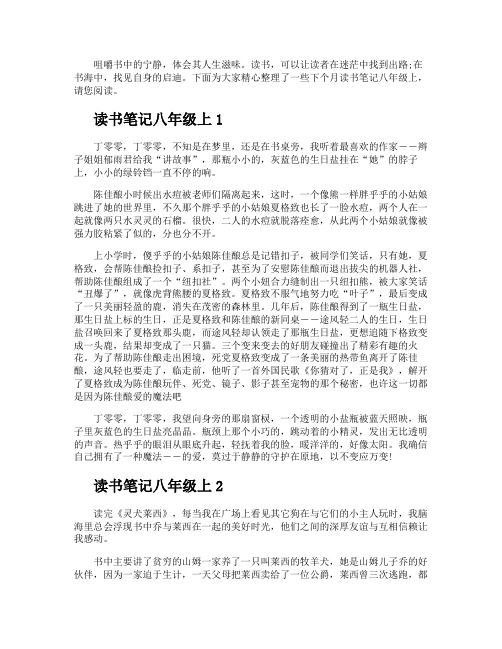
咀嚼书中的宁静,体会其人生滋味。
读书,可以让读者在迷茫中找到出路;在书海中,找见自身的启迪。
下面为大家精心整理了一些下个月读书笔记八年级上,请您阅读。
读书笔记八年级上1丁零零,丁零零,不知是在梦里,还是在书桌旁,我听着最喜欢的作家――辫子姐姐郁雨君给我“讲故事”,那瓶小小的,灰蓝色的生日盐挂在“她”的脖子上,小小的绿铃铛一直不停的响。
陈佳酿小时候出水痘被老师们隔离起来,这时,一个像熊一样胖乎乎的小姑娘跳进了她的世界里,不久那个胖乎乎的小姑娘夏格致也长了一脸水痘,两个人在一起就像两只水灵灵的石榴。
很快,二人的水痘就脱落痊愈,从此两个小姑娘就像被强力胶粘紧了似的,分也分不开。
上小学时,傻乎乎的小姑娘陈佳酿总是记错扣子,被同学们笑话,只有她,夏格致,会帮陈佳酿捡扣子、系扣子,甚至为了安慰陈佳酿而退出拔尖的机器人社,帮助陈佳酿组成了一个“纽扣社”。
两个小妞合力缝制出一只纽扣熊,被大家笑话“丑爆了”,就像虎背熊腰的夏格致。
夏格致不服气地努力吃“叶子”,最后变成了一只美丽轻盈的鹿,消失在茂密的森林里。
几年后,陈佳酿得到了一瓶生日盐,那生日盐上标的生日,正是夏格致和陈佳酿的新同桌――途风轻二人的生日,生日盐召唤回来了夏格致那头鹿,而途风轻却认领走了那瓶生日盐,更想追随下格致变成一头鹿,结果却变成了一只猫。
三个变来变去的好朋友碰撞出了精彩有趣的火花。
为了帮助陈佳酿走出困境,死党夏格致变成了一条美丽的热带鱼离开了陈佳酿,途风轻也要走了,临走前,他听了一首外国民歌《你猜对了,正是我》,解开了夏格致成为陈佳酿玩伴、死党、镜子、影子甚至宠物的那个秘密,也许这一切都是因为陈佳酿爱的魔法吧丁零零,丁零零,我望向身旁的那扇窗棂,一个透明的小盐瓶被蓝天照映,瓶子里灰蓝色的生日盐亮晶晶。
瓶颈上那个小巧的,跳动着的小精灵,发出无比透明的声音。
热乎乎的眼泪从眼底升起,轻抚着我的脸,暖洋洋的,好像太阳。
我确信自己拥有了一种魔法――的爱,莫过于静静的守护在原地,以不变应万变!读书笔记八年级上2读完《灵犬莱西》,每当我在广场上看见其它狗在与它们的小主人玩时,我脑海里总会浮现书中乔与莱西在一起的美好时光,他们之间的深厚友谊与互相信赖让我感动。
关于读书笔记15篇八年级上册
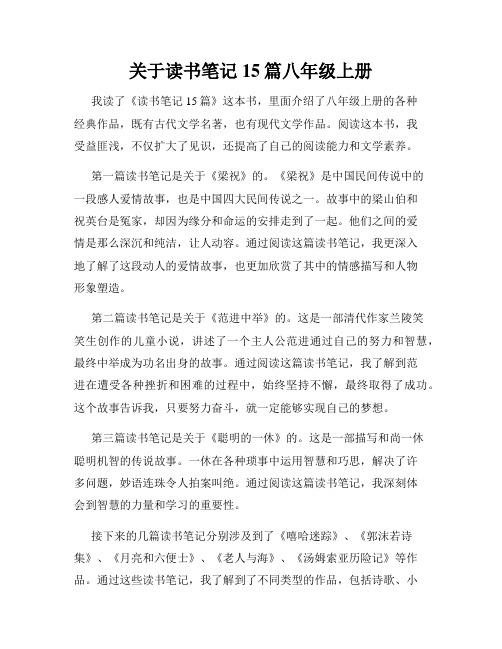
关于读书笔记15篇八年级上册我读了《读书笔记15篇》这本书,里面介绍了八年级上册的各种经典作品,既有古代文学名著,也有现代文学作品。
阅读这本书,我受益匪浅,不仅扩大了见识,还提高了自己的阅读能力和文学素养。
第一篇读书笔记是关于《梁祝》的。
《梁祝》是中国民间传说中的一段感人爱情故事,也是中国四大民间传说之一。
故事中的梁山伯和祝英台是冤家,却因为缘分和命运的安排走到了一起。
他们之间的爱情是那么深沉和纯洁,让人动容。
通过阅读这篇读书笔记,我更深入地了解了这段动人的爱情故事,也更加欣赏了其中的情感描写和人物形象塑造。
第二篇读书笔记是关于《范进中举》的。
这是一部清代作家兰陵笑笑生创作的儿童小说,讲述了一个主人公范进通过自己的努力和智慧,最终中举成为功名出身的故事。
通过阅读这篇读书笔记,我了解到范进在遭受各种挫折和困难的过程中,始终坚持不懈,最终取得了成功。
这个故事告诉我,只要努力奋斗,就一定能够实现自己的梦想。
第三篇读书笔记是关于《聪明的一休》的。
这是一部描写和尚一休聪明机智的传说故事。
一休在各种琐事中运用智慧和巧思,解决了许多问题,妙语连珠令人拍案叫绝。
通过阅读这篇读书笔记,我深刻体会到智慧的力量和学习的重要性。
接下来的几篇读书笔记分别涉及到了《嘻哈迷踪》、《郭沫若诗集》、《月亮和六便士》、《老人与海》、《汤姆索亚历险记》等作品。
通过这些读书笔记,我了解到了不同类型的作品,包括诗歌、小说、散文等。
每一篇读书笔记都有自己独特的风格和主题,每一个作品都给我留下了深刻的印象。
阅读这些读书笔记的过程中,我不仅了解到了各个作品的故事情节和主题思想,还进一步培养了自己的阅读理解和分析能力。
通过读书笔记的帮助,我更好地理解了作者的用意和创作背景,也更深入地探索了作品所表达的思想和情感。
除了作品本身,这些读书笔记还有一个共同点,就是对读书的态度和认识的探索。
每一篇读书笔记都在反思和思考读书的意义,呼吁人们要注重读书,培养良好的阅读习惯。
关于读书笔记15篇八年级上册

关于读书笔记15篇八年级上册读书是一种享受,并且对于每个人来说都是一种重要的学习方式。
阅读可以帮助我们拓展视野,并获得新的知识和见解。
在八年级上册的学习中,我读了许多好书,这些书籍帮助我更好地了解自己和世界。
这里我将分享我阅读这些书籍后的一些感想。
【第一篇】《哈利·波特与魔法石》《哈利·波特与魔法石》是一本扣人心弦的奇幻小说。
故事中的主人公哈利·波特以及他的朋友们,充满魅力和勇气。
这本书教会了我毅力和勇敢面对困境。
故事中的魔法世界充满奇观,带给我无尽的想象力。
通过读这本书,我学到了友谊的重要性以及不怕困难和邪恶的鼓励。
【第二篇】《西游记》《西游记》是一本古代中国文学经典,故事讲述了孙悟空和他的朋友们历险取经的故事。
通过阅读这本书,我了解到了中国古代文化和思想。
同时,故事中的主人公们一直坚持不懈地追求目标,勇敢地面对各种挑战。
这本书让我明白了奋斗和团结的意义。
【第三篇】《小王子》《小王子》是一本让人感动的童话故事。
在这个故事中,小王子是一个纯真而善良的人,他与各种奇特的角色进行了对话。
通过这些对话,小王子学会了关爱和理解。
这本书提醒我们注意真正重要的事物,同时也教会我们怀抱对世界的好奇心和尊重。
【第四篇】《傲慢与偏见》《傲慢与偏见》是一本经典的爱情小说。
故事中的女主角伊丽莎白·班内特聪明而独立,她坚持自己的信仰,并勇敢地寻找真爱。
通过读这本书,我学会了不要被外表所迷惑,要用心去了解一个人。
同时,这本书也揭示了社会的偏见和人们对爱情的不同观念。
【第五篇】《红楼梦》《红楼梦》是一部古典长篇小说,描述了贾宝玉和林黛玉之间的悲剧爱情故事。
通过这个故事,我了解到了封建社会的残酷和不公。
这本书反映了人性的复杂性和人们对权力和爱情的追求。
在阅读《红楼梦》的过程中,我思考了生命的真谛和世界的无常。
【第六篇】《挪威的森林》《挪威的森林》是一部描述青春痛苦和思考的现代小说。
这个故事引发了我对青春期的共鸣。
读书笔记摘抄八年级上册
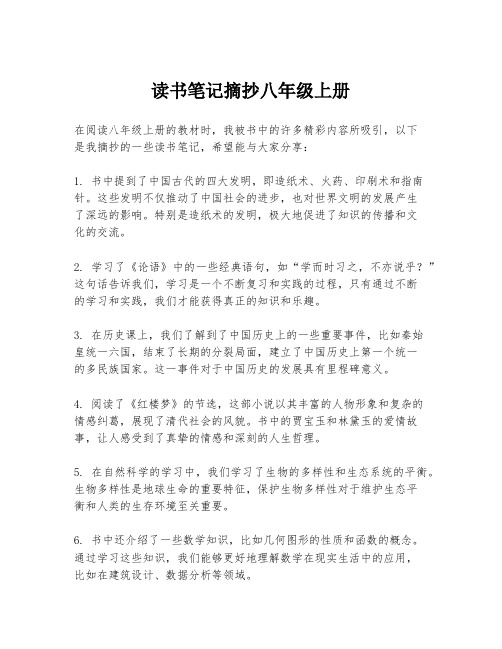
读书笔记摘抄八年级上册在阅读八年级上册的教材时,我被书中的许多精彩内容所吸引,以下是我摘抄的一些读书笔记,希望能与大家分享:1. 书中提到了中国古代的四大发明,即造纸术、火药、印刷术和指南针。
这些发明不仅推动了中国社会的进步,也对世界文明的发展产生了深远的影响。
特别是造纸术的发明,极大地促进了知识的传播和文化的交流。
2. 学习了《论语》中的一些经典语句,如“学而时习之,不亦说乎?”这句话告诉我们,学习是一个不断复习和实践的过程,只有通过不断的学习和实践,我们才能获得真正的知识和乐趣。
3. 在历史课上,我们了解到了中国历史上的一些重要事件,比如秦始皇统一六国,结束了长期的分裂局面,建立了中国历史上第一个统一的多民族国家。
这一事件对于中国历史的发展具有里程碑意义。
4. 阅读了《红楼梦》的节选,这部小说以其丰富的人物形象和复杂的情感纠葛,展现了清代社会的风貌。
书中的贾宝玉和林黛玉的爱情故事,让人感受到了真挚的情感和深刻的人生哲理。
5. 在自然科学的学习中,我们学习了生物的多样性和生态系统的平衡。
生物多样性是地球生命的重要特征,保护生物多样性对于维护生态平衡和人类的生存环境至关重要。
6. 书中还介绍了一些数学知识,比如几何图形的性质和函数的概念。
通过学习这些知识,我们能够更好地理解数学在现实生活中的应用,比如在建筑设计、数据分析等领域。
7. 英语课上,我们学习了一些基本的语法规则和词汇,这对于提高我们的英语水平和跨文化交流能力非常有帮助。
通过不断的练习和应用,我们可以更加自信地使用英语进行沟通。
8. 书中还提到了体育锻炼的重要性,强调了健康的生活方式对于个人成长和学习的重要性。
通过参加体育活动,我们不仅能够增强体质,还能培养团队合作精神和竞争意识。
这些读书笔记只是八年级上册教材中的一部分内容,但它们代表了我们在学习过程中的一些重要收获。
通过不断的学习和思考,我们能够更好地理解世界,丰富自己的知识和经验。
八年级上册《闪电照耀中国》读书笔记6篇

八年级上册《闪电照耀中国》读书笔记6篇八年级上册《闪电照耀中国》读书笔记第一篇:《闪电照耀中国》的主要内容《闪电照耀中国》是八年级上册的一本教材,主要介绍了中国在科技、医疗、经济等领域的发展和取得的成就。
书中通过生动的案例和实际数据,向读者展示了中国在各个方面的进展,让人对中国的未来充满了希望。
第二篇:科技的迅速发展在《闪电照耀中国》中,我们可以看到中国在科技领域的迅速发展。
例如,中国的互联网技术在全球范围内都有着重要的地位,支付宝、微信等移动支付工具已经成为人们生活中不可或缺的一部分。
同时,中国在人工智能、大数据等领域也取得了重要突破,国内的科技企业正在成为全球竞争中的领导者。
第三篇:医疗水平的提升《闪电照耀中国》还介绍了中国医疗水平的提升。
中国的医疗技术在世界上有着很高的声誉,中国的医生不仅在国内治疗疑难杂症,还经常为国外的患者提供医疗服务。
此外,中国的医疗科技也在不断发展,诸如脑科学、基因治疗等方面取得了重大突破。
第四篇:经济发展的成果《闪电照耀中国》中还通过实际数据展示了中国经济的快速增长。
中国已经成为世界上第二大经济体,并且仍然保持着较高的增长速度。
中国在国际贸易中的地位不断提升,越来越多的中国企业在世界范围内具有竞争力。
同时,中国政府也采取了一系列措施来推动经济的发展,进一步改善了人们的生活水平。
第五篇:创新的重要性《闪电照耀中国》强调了创新在中国发展中的重要性。
中国政府高度重视创新,鼓励人们勇于尝试新的事物,并提供支持和保护。
不仅如此,中国的大学和科研机构也在加强创新能力的培养,培养了许多优秀的科学家和企业家。
通过创新,中国不断提升自己的核心竞争力,在全球舞台上展现中国的价值。
第六篇:展望未来《闪电照耀中国》让我对中国的未来充满了希望。
在全球化的背景下,中国的发展已经成为世界关注的焦点。
中国不仅在科技、医疗、经济等方面取得了显著进展,还在全球事务中发挥着重要作用。
未来,我相信中国将继续在各个领域中创造奇迹,为人类的进步做出更大的贡献。
关于读书笔记摘抄10篇八年级上册
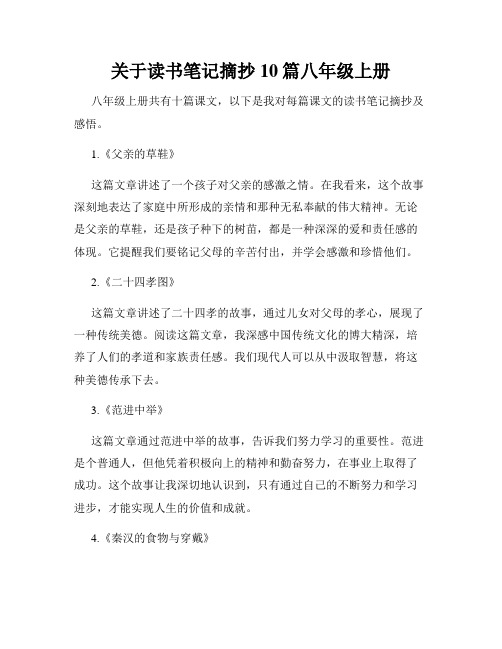
关于读书笔记摘抄10篇八年级上册八年级上册共有十篇课文,以下是我对每篇课文的读书笔记摘抄及感悟。
1.《父亲的草鞋》这篇文章讲述了一个孩子对父亲的感激之情。
在我看来,这个故事深刻地表达了家庭中所形成的亲情和那种无私奉献的伟大精神。
无论是父亲的草鞋,还是孩子种下的树苗,都是一种深深的爱和责任感的体现。
它提醒我们要铭记父母的辛苦付出,并学会感激和珍惜他们。
2.《二十四孝图》这篇文章讲述了二十四孝的故事,通过儿女对父母的孝心,展现了一种传统美德。
阅读这篇文章,我深感中国传统文化的博大精深,培养了人们的孝道和家族责任感。
我们现代人可以从中汲取智慧,将这种美德传承下去。
3.《范进中举》这篇文章通过范进中举的故事,告诉我们努力学习的重要性。
范进是个普通人,但他凭着积极向上的精神和勤奋努力,在事业上取得了成功。
这个故事让我深切地认识到,只有通过自己的不断努力和学习进步,才能实现人生的价值和成就。
4.《秦汉的食物与穿戴》这篇文章介绍了秦汉时期的食物和穿戴。
通过阅读,我了解到了中国古代的食文化和服饰文化,在其中找到了一种传承和发展的力量。
我相信通过对古人智慧的学习和传承,我们能够更好地认识自己,并秉持着优秀的传统走向更美好的未来。
5.《成语故事》这篇文章介绍了一些常用的成语及其故事。
成语在我们的日常生活中十分常见,而了解它们背后的故事能够丰富我们的文化素养。
通过学习这些成语,我对中华文化的深厚底蕴有了更深层次的理解。
6.《孔子之道》这篇文章介绍了孔子的思想和道德观念。
孔子被尊为中国古代的圣人,他的思想对于中华传统文化的影响深远。
通过孔子的智慧,我们能够找到生活中的真谛,并学会待人接物、做一个更有道德意识的人。
7.《龙的传人》这篇文章通过讲述龙在中国文化中的意义,表达了对先祖和传统的敬仰和怀念。
龙是中华民族的象征,它寓意着力量和权威,代表着中国人民的团结和坚韧。
读完这篇文章,我更加自豪地认识到自己是中华民族的一员,并立志为中华文化的传承贡献自己的力量。
初二学生的读书笔记(精选6篇)

初二学生的读书笔记(精选6篇)初二学生的读书笔记(精选6篇)当仔细品读一部作品后,大家心中一定有不少感悟,不能光会读哦,写一篇读书笔记吧。
可是读书笔记怎么写才合适呢?以下是小编帮大家整理的初二读书笔记,欢迎阅读,希望大家能够喜欢。
初二读书笔记篇1“话说天下大事,分久必合,合久必分”最近,我读了中国四大名著之一的《三国演义》。
我感受良深。
《三国演义》是由罗贯中根据魏晋时代的史书与宋代的三分、元代的三国戏和罗贯中自己的思想合并在一起的`小说。
《三国演义》主要记叙了三国时代的群雄争霸的故事。
在这个群雄争霸的时代有许多英雄豪杰。
例如:德才兼备的刘备,神机妙算的诸葛亮,有勇有谋的关羽,直爽豪迈的张飞,老当益壮的黄忠,老奸巨猾的曹操等。
对于《三国演义》我还有别的看法。
在《三国演义》中罗贯中把刘备写得十分仁义,还携民渡江,依我看,就是他携民渡江是真的,他也不一定是仁义君子,只是为了取得民心,这样他就好不到哪里去。
而且,刘备太喜欢哭了,简直是“哭神”。
在《三国演义》中他不知哭了多少回,一遇到丧气事就哭,这样他也好不到那里去。
最重要的是,刘备太依靠诸葛亮了,什么事情都交给诸葛亮。
人们说刘备“三顾茅庐”是重视人才,依我看,他就是想找个依靠,找个有才能的人帮自己管理而已。
《三国演义》说曹操是奸雄,可我认为他才应该是大英雄。
他很重视人才,许攸来投靠他,他连鞋子都没穿就去接待他。
刘备只是依靠人才,而曹操是听取人才的意见,结合自己的才智来管理军队,他才是真正的大英雄。
滚滚长江东逝水,浪花淘尽英雄。
是非成败转头空。
初二读书笔记篇2《子夜》既从多方面的错综复杂的社会关系和各种矛盾冲突中突出吴荪甫的性格特征,也注重人物心理刻画,并通过景物描写渲染气氛、衬托人物情绪的变化,借以显示其性格。
吴荪甫形象及其失败的道路真实地表现了20世纪30年代初期中国民族资产阶级的特点、处境和悲剧性的命运,形象地说明了资本主义道路在中国走不通,深刻地揭示了中国半殖民地半封建的性质。
八年级上册读书笔记范文-优秀范文5篇
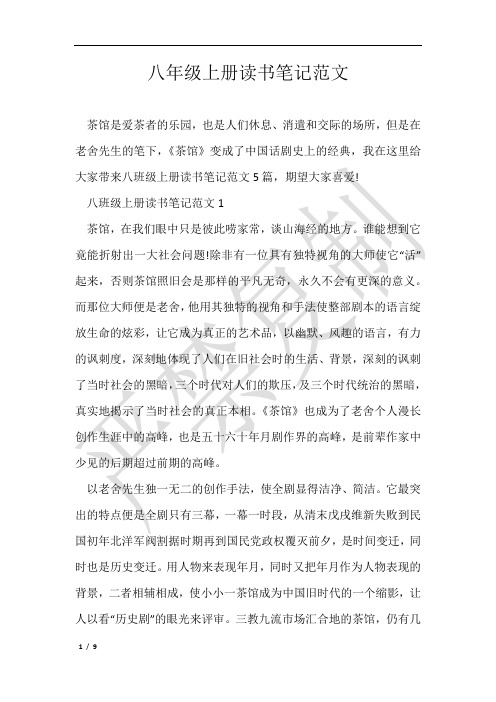
八年级上册读书笔记范文茶馆是爱茶者的乐园,也是人们休息、消遣和交际的场所,但是在老舍先生的笔下,《茶馆》变成了中国话剧史上的经典,我在这里给大家带来八班级上册读书笔记范文5篇,期望大家喜爱!八班级上册读书笔记范文1茶馆,在我们眼中只是彼此唠家常,谈山海经的地方。
谁能想到它竟能折射出一大社会问题!除非有一位具有独特视角的大师使它“活”起来,否则茶馆照旧会是那样的平凡无奇,永久不会有更深的意义。
而那位大师便是老舍,他用其独特的视角和手法使整部剧本的语言绽放生命的炫彩,让它成为真正的艺术品,以幽默、风趣的语言,有力的讽刺度,深刻地体现了人们在旧社会时的生活、背景,深刻的讽刺了当时社会的黑暗,三个时代对人们的欺压,及三个时代统治的黑暗,真实地揭示了当时社会的真正本相。
《茶馆》也成为了老舍个人漫长创作生涯中的高峰,也是五十六十年月剧作界的高峰,是前辈作家中少见的后期超过前期的高峰。
以老舍先生独一无二的创作手法,使全剧显得洁净、简洁。
它最突出的特点便是全剧只有三幕,一幕一时段,从清末戊戌维新失败到民国初年北洋军阀割据时期再到国民党政权覆灭前夕,是时间变迁,同时也是历史变迁。
用人物来表现年月,同时又把年月作为人物表现的背景,二者相辅相成,使小小一茶馆成为中国旧时代的一个缩影,让人以看“历史剧”的眼光来评审。
三教九流市场汇合地的茶馆,仍有几位核心人物始终贯穿其中,例如茶馆掌柜王利发,胆儿小的松二爷,非常爱国并胸怀正义常四爷等等。
茶客间说的不是客套话便是奉承话,他们之间的谈话使人更能深刻的体会到世态炎凉。
《茶馆》中语言的精妙运用,同样让人印象深刻,尤其是第一幕里茶客的东一句西一句,左一下右一下。
那都是北京语言的精华,都是近百年京都生活的沉淀。
它们多彩而不杂乱,节奏明快又一气呵成。
这使得第一幕成为全剧的高峰,后边两幕也是由第一幕而来,托着衬着第一幕构成整部戏。
但是,老舍先生的《茶馆》,并不像曹禺先生代表作《雷雨》一样,在舞台上演了半个多世纪,《茶馆》低调的很,仅有一个电影演员剧团,算是业余演话剧,排过,在郊区剧场也只演过一两场。
关于读书笔记摘抄15篇八年级上册
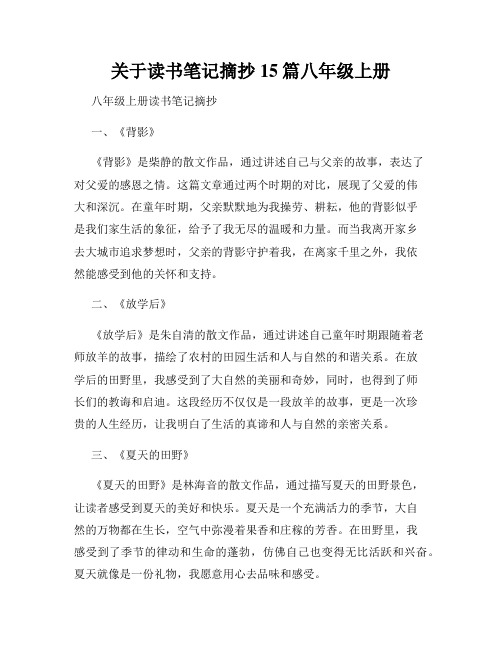
关于读书笔记摘抄15篇八年级上册八年级上册读书笔记摘抄一、《背影》《背影》是柴静的散文作品,通过讲述自己与父亲的故事,表达了对父爱的感恩之情。
这篇文章通过两个时期的对比,展现了父爱的伟大和深沉。
在童年时期,父亲默默地为我操劳、耕耘,他的背影似乎是我们家生活的象征,给予了我无尽的温暖和力量。
而当我离开家乡去大城市追求梦想时,父亲的背影守护着我,在离家千里之外,我依然能感受到他的关怀和支持。
二、《放学后》《放学后》是朱自清的散文作品,通过讲述自己童年时期跟随着老师放羊的故事,描绘了农村的田园生活和人与自然的和谐关系。
在放学后的田野里,我感受到了大自然的美丽和奇妙,同时,也得到了师长们的教诲和启迪。
这段经历不仅仅是一段放羊的故事,更是一次珍贵的人生经历,让我明白了生活的真谛和人与自然的亲密关系。
三、《夏天的田野》《夏天的田野》是林海音的散文作品,通过描写夏天的田野景色,让读者感受到夏天的美好和快乐。
夏天是一个充满活力的季节,大自然的万物都在生长,空气中弥漫着果香和庄稼的芳香。
在田野里,我感受到了季节的律动和生命的蓬勃,仿佛自己也变得无比活跃和兴奋。
夏天就像是一份礼物,我愿意用心去品味和感受。
四、《荷塘月色》《荷塘月色》是林语堂的散文作品,通过描写荷塘的美景和夜晚的月色,表达了作者对荷塘的喜爱和独特情感。
荷塘在夜晚变得更加神秘和诱人,漫天的星辰和皎洁的月光照亮了整个荷塘,给人一种宁静和安详的感觉。
在这样的美景面前,作者的思绪也在夜晚的静谧中得到了放松和升华。
五、《战国策·足下》《战国策·足下》是司马迁的散文作品,通过讲述孟子从足下渡河的故事,表达了孟子为人忠诚和正直的品质。
在足下渡河的那一刻,孟子可以选择背叛、逃避,但他却义无反顾地选择了正义和坚持。
这个故事告诉我们,人应该有自己的原则和底线,无论处境如何,都应该保持清醒的头脑和坚定的信念。
六、《写梦》《写梦》是韩愈的散文作品,通过描写自己梦见父亲的故事,表达了对亲人的思念和对生死的思考。
初二读书笔记(精选5篇)

初二读书笔记(精选5篇)初二篇11、一个神圣甲虫的地穴不久就被找到了,或者你也知道,它的土穴上面,总会有一堆新鲜的泥土积在上面。
我的同伴用我的小刀铲向地下拼命的掘,我则伏在地上,因为这样容易看见有什么东西被掘出来。
一个洞穴掘开,在潮湿的泥土里,我发现了一个精制的梨。
我真是不会忘记这是我第一次看见,一个母甲虫的奇异的工作呢!当挖掘古代埃及遗物的时候,如果我发现这神圣甲虫是用翡翠雕刻的,我的兴奋却也不见得更大呢。
2、在南方有一种昆虫,与蝉一样,很能引起人的兴趣,但不怎么出名,因为它不能唱歌。
如果它也有一种钹,它的声誉,应比有名的音乐家要大得多,因为它在形状上与习惯上都十分的不平常。
它将是一名出色的乐手。
3、在我自己的工作室里,用大口玻璃瓶装满泥土,为母甲虫做成人工的地穴,并留下一个小孔以便观察它的动作,因此它工作的各项程序我都可以看得见。
4、蝉与我"比邻相守",到现在已有十五年了,每个夏天差不多有两个月之久,它们总不离我的视线,而歌声也不离我的耳畔。
5、石蚕原本是生长在泥潭沼泽中的芦苇丛里的。
在许多时候,它依附在芦苇的断枝上,随芦苇在水中漂泊。
那小鞘就是它的活动房子,也可以说是它旅行时随身带的简易房子。
6、这时候它的颜色是红白色,在变成檀木的黑色之前,它是要换好几回衣服的,颜色渐黑,硬度渐强,直到披上角质的甲胄,才是完全长成的甲虫。
7、泥水匠蜂的窠巢是利用硬的灰泥制做而成的。
一般它的巢都围绕在树枝的四周。
由于是灰泥组成的,所以它就能够非常坚固地附着在上面。
但是,泥水匠蜂的窠巢,只是用泥土做成的,没有加水泥,或者是其它什么更能让它坚固的基础。
那么,它怎么解决这些问题呢?8、七月时节,当我们这里的昆虫,为口渴所苦,失望地在已经枯萎的花上,跑来跑去寻找饮料时,蝉则依然很舒服,不觉得痛苦。
用它突出的嘴--一个精巧的吸管,尖利如锥子,收藏在胸部--刺穿饮之不竭的圆桶。
它坐在树的枝头,不停的唱歌,只要钻通柔滑的树皮,里面有的是汁液,吸管插进桶孔,它就可饮个饱了。
八年级上册读书笔记

八年级上册读书笔记八年级上册读书笔记篇1八年级上册读书笔记《红岩》这部作品给我留下了深刻的印象,它是一部描述中国革命历史的小说,讲述了在国民党统治下,共产党人如何通过坚韧不拔的努力,最终取得胜利的故事。
这部小说的主题和主题是关于革命和反抗的故事。
通过小说,作者向我们展示了共产党人对于自由和正义的不懈追求,以及他们如何通过智慧和勇气,战胜强大的敌人。
在阅读这部小说时,我被共产党人的坚韧和毅力深深打动。
他们面对强大的敌人,身处恶劣的环境,却始终坚守信仰,坚定不移。
他们的奋斗和牺牲,为后来的革命事业打下了坚实的基础。
除了共产党人,我也被小说中那些无辜的人民深深地感动。
他们忍受着极端的压迫和剥削,却始终保持着希望和信念。
他们的善良和宽容,成为了革命的源泉。
总的来说,《红岩》是一部描绘了革命历史的小说,它让我深刻地理解了革命的艰辛和伟大。
它让我明白,每一个为了自由和正义而奋斗的人,都是值得尊敬的。
八年级上册读书笔记篇2八年级上册读书笔记《红岩》是一本描绘中国革命历史的小说,它通过生动的情节和形象的人物刻画,展示了那个时期中国人民的苦难和抗争。
在阅读这本书的过程中,我深深地感受到了中国人民在面对压迫和不公时所表现出的坚韧和勇敢。
小说中的主人公们不仅在面对生死考验时毫不畏惧,而且在敌人的严刑拷打下也始终坚守着信仰和理想。
他们的精神让我深受启发,让我明白了什么是真正的英雄主义。
此外,这本书也让我对中国的革命历史有了更深入的了解。
它让我看到了那个时期中国人民的苦难和抗争,也让我看到了革命先烈们的坚定信念和不屈精神。
这种历史教育对于我们年轻人来说是十分必要的,它可以帮助我们更好地认识和理解自己的文化传统,也可以让我们更加珍惜今天的幸福生活。
总之,《红岩》是一本非常值得一读的小说,它不仅让我深刻地理解了中国的革命历史,也让我受到了很大的启发。
我相信,这本书中的精神将会一直激励着我,让我在未来的生活中不断前行,为实现自己的梦想而努力奋斗。
优秀读书笔记2篇八年级上册

优秀读书笔记2篇八年级上册优秀读书笔记2篇(八年级上册)读书是我最喜欢的一项爱好,通过读书,我能够丰富自己的知识,提升自己的思维能力。
在八年级上册的学习中,我读了两本优秀的书籍,分别是《红与黑》和《平凡的世界》。
这两本书有着不同的主题和故事情节,但都给我留下了深刻的印象。
下面我将分节论述我对这两本书的读后感。
第一章:《红与黑》《红与黑》是法国作家司汤达的作品,以19世纪法国社会为背景,讲述了青年贵族朱利安·索里尔通过自己的智慧和勇气,逐渐爬升到教士和高级官员的故事。
这本书给我留下了深刻的印象。
通过朱利安的奋斗和冷静机智的思考,作者揭示了社会阶层对人的限制和社会不公平的现象。
朱利安面对的各种挑战和考验,让人思考人性的复杂性以及如何在现实中取得成功。
同时,作者还通过对朱利安心理的刻画,展现了一个内心矛盾的人物形象。
这本书给我带来了很大的思考。
虽然我们生活在不同的时代和社会,但仍然可以从中汲取智慧和勇气,培养自己的人生观和价值观。
通过《红与黑》,我了解到了人类社会的复杂性和变革的重要性。
同时,我也明白了要在现实中取得成功,需要不断提高自己的能力和思维方式。
第二章:《平凡的世界》《平凡的世界》是作家路遥的作品,通过讲述原始小学教师孙少平的成长故事,揭示了中国社会从上世纪50年代到70年代的变革和社会发展。
这本书给我留下了深刻的印象。
通过孙少平的成长和奋斗,作者生动地描绘了一个普通人在特殊的历史背景下的艰辛生活。
孙少平勤奋学习、努力工作,最终成为一名优秀的教师,同时也经历了家庭、事业和爱情的波折与考验。
通过这个故事,我深刻地感受到了人生的辛酸和坎坷,以及努力奋斗的重要性。
这本书给我带来了很多启示。
尽管我们生活在不同的时代和环境,但每个人都会面临各种各样的困难和挑战。
通过《平凡的世界》,我明白了只有通过不断努力和奋斗,才能够实现自己的人生价值。
在现实中,每个人都应该坚持自己的理想,为了生活的幸福和自己的梦想而努力。
关于新的初二读书心得笔记10篇范文

关于新的初二读书心得笔记10篇范文(实用版)编制人:__________________审核人:__________________审批人:__________________编制单位:__________________编制时间:____年____月____日序言下载提示:该文档是本店铺精心编制而成的,希望大家下载后,能够帮助大家解决实际问题。
文档下载后可定制修改,请根据实际需要进行调整和使用,谢谢!并且,本店铺为大家提供各种类型的教育资料,如工作总结、求职文档、合同范本、心得体会、活动方案、演讲范文、读后感、作文大全、实习报告、其他范文等等,想了解不同资料格式和写法,敬请关注!Download tips: This document is carefully compiled by this editor.I hope that after you download it, it can help you solve practical problems. The document can be customized and modified after downloading, please adjust and use it according to actual needs, thank you!And, this store provides various types of educational materials for everyone, such as work summaries, job application documents, contract templates, experiences, activity plans, speech templates, post reading feedback, essay summaries, internship reports, other templates, etc. If you want to learn about different data formats and writing methods, please pay attention!关于新的初二读书心得笔记10篇范文本文是精彩最新发布的关于新的初二读书心得笔记10篇范文(优选)的详细心得体会范文参考文章,觉得有用就收藏了,这里给摘抄给大家学习。
初二语文书读书笔记摘抄(3篇)
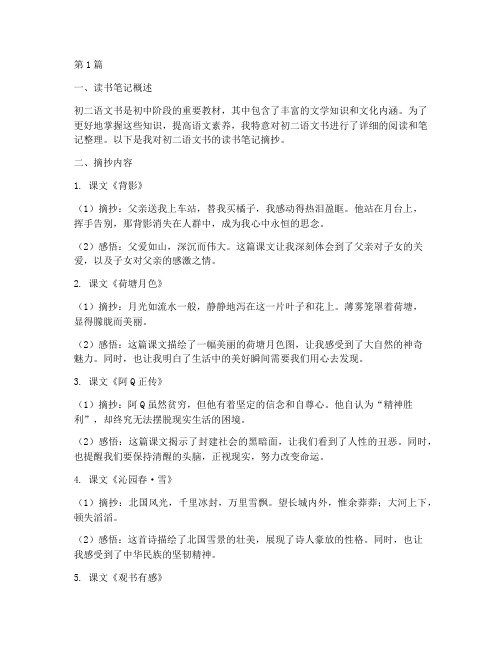
第1篇一、读书笔记概述初二语文书是初中阶段的重要教材,其中包含了丰富的文学知识和文化内涵。
为了更好地掌握这些知识,提高语文素养,我特意对初二语文书进行了详细的阅读和笔记整理。
以下是我对初二语文书的读书笔记摘抄。
二、摘抄内容1. 课文《背影》(1)摘抄:父亲送我上车站,替我买橘子,我感动得热泪盈眶。
他站在月台上,挥手告别,那背影消失在人群中,成为我心中永恒的思念。
(2)感悟:父爱如山,深沉而伟大。
这篇课文让我深刻体会到了父亲对子女的关爱,以及子女对父亲的感激之情。
2. 课文《荷塘月色》(1)摘抄:月光如流水一般,静静地泻在这一片叶子和花上。
薄雾笼罩着荷塘,显得朦胧而美丽。
(2)感悟:这篇课文描绘了一幅美丽的荷塘月色图,让我感受到了大自然的神奇魅力。
同时,也让我明白了生活中的美好瞬间需要我们用心去发现。
3. 课文《阿Q正传》(1)摘抄:阿Q虽然贫穷,但他有着坚定的信念和自尊心。
他自认为“精神胜利”,却终究无法摆脱现实生活的困境。
(2)感悟:这篇课文揭示了封建社会的黑暗面,让我们看到了人性的丑恶。
同时,也提醒我们要保持清醒的头脑,正视现实,努力改变命运。
4. 课文《沁园春·雪》(1)摘抄:北国风光,千里冰封,万里雪飘。
望长城内外,惟余莽莽;大河上下,顿失滔滔。
(2)感悟:这首诗描绘了北国雪景的壮美,展现了诗人豪放的性格。
同时,也让我感受到了中华民族的坚韧精神。
5. 课文《观书有感》(1)摘抄:问渠那得清如许?为有源头活水来。
(2)感悟:这首诗告诉我们,只有不断学习,才能保持思想的清醒和活力。
源头活水象征着知识的源泉,我们要努力汲取,不断丰富自己的内涵。
6. 课文《秋天的怀念》(1)摘抄:秋天来了,落叶纷飞,仿佛在诉说着离别的哀愁。
(2)感悟:这篇课文让我们感受到了秋天带来的哀愁和怀念。
同时,也让我们明白了生命的短暂,要珍惜眼前的时光。
7. 课文《醉翁亭记》(1)摘抄:醉翁之意不在酒,在乎山水之间也。
- 1、下载文档前请自行甄别文档内容的完整性,平台不提供额外的编辑、内容补充、找答案等附加服务。
- 2、"仅部分预览"的文档,不可在线预览部分如存在完整性等问题,可反馈申请退款(可完整预览的文档不适用该条件!)。
- 3、如文档侵犯您的权益,请联系客服反馈,我们会尽快为您处理(人工客服工作时间:9:00-18:30)。
新版八年级上册读书笔记总结Unit 1 Where did you go on vacation?基本词组:stayed at home 呆在家went to the mountains 去爬山went to New York City去纽约went to the beach 去沙滩went to summer camp去夏令营visited my uncle拜访叔叔visited museums去博物馆go on vacation=be on vacation 去度假句型:1Where did you go on vacation ? I went to the mountains.2 Did you buy anything special? Yes, I bought something for my father.3 How was the food? Everything tasted really good.固定搭配知识点1Long time no see. 好久不见2 something interesting 有趣的一些事情(形容词修饰不定代词形容词后置)不定代词:everything everybody everywheresomething somebody somewhereanything anybody anywherenothing nobody no where3 quite a few 相当多拓展:a few, few , a little, little,**a few:有几个,有一些(修饰可数名词)eg.He has a few friends here.**few:很少,几乎没有(修饰可数名词,否定)eg.Few people liked trains at that time.那个时候很少有人喜欢火车。
**a little:有一点,有一些(修饰不可数名词)eg. There is a little milk left in the bottle.瓶子里还剩一点牛奶。
**little:很少,几乎没有(修饰不可数名词,否定)eg. There is little food in the fridge.冰箱里几乎没有食物。
There are ________ students doing their homework; ________students play outdoor. They can bring _________ water to school, but there is _________ water in the afternoon.________________________________________________________________________________________________4 most of ...中的大多数most of+名词5 decide to do sth 决定做某事eg. I decide to go to the park next week. 我决定下周去公园。
6 辨析bored, boringbored:指人感到无聊,无趣eg. She is bored with her job.boring:指事物让人感到无聊,无趣eg. This is a boring book.拓展:以--ed结尾,人做主语以ing结尾,物做主语interested 感兴趣的interesting 令人感到无趣的worried 感到着急worrying 令人着急tired 感到疲倦tiring 令人感到无聊的frightened 感到害怕frightening 令人害怕的excited 使人激动exciting 令人兴奋的7 buy sth for sb = buy sb sth 为某人买某物eg.Would you please buy a ticket for her?= Would you please buy her a ticket?8 try to do sth 试着做某事try one’s best to do sth 尽某人最大的努力做某事eg. You must try your best to finish your homework. 你必须进最大的努力完成作业。
9 feel like 给...的感觉;感受到--------- feel like doing sth 想要做某事Eg. Do you feel like walking to the sea?你想要到海边散步吗?10 enjoy doing sth= have a good time= have (a lot of ) fun= have a nice time 玩得高兴11 too many +可数名词复数(太多)eg. There are too many cars on the srteet.辨析:too much+不可数名词eg. I have too much homework to do.12 because of+名词/代词/动名词(因为)eg. He is absent because of his illness. 他缺席因为他的疾病。
Unit 2 How often do you exercise?基本词组:help with housework 帮忙做家务watch TV 看电视read newspaper 看报go shopping 去购物go to the movies 看电影use the internet 使用网络have piano lessons 上钢琴课关于频度的副词以及词组always-------- usually ---------- often ------------ sometimes ----------hardly ever ------------ never总是通常经常有时几乎不从不every day 每天once a week 一周一次twice a week 一周两次three times a week 一周三次four or three times a week 一周三到四次句型:What do you usually do on weekends? I always exercise.How often do yu go to the movies? 你多久看一次电影?I go to the movies once a month. 我一个月去一次。
固定搭配知识点:1 next week is quite full for me 下周的事情已经排满了。
2 How about= What about怎么样?做某事怎么样: how about doing sth/what about doing sth3 stay up 熬夜;stay up doing sth 熬夜做某事She stayed up reading books.她熬夜读书。
4 mind doing sth 介意做某事eg. Do you mind me smoking here?你介意我在这里抽烟吗?拓展:make up one’s mind 下决心change one’s mind 改变主意never mind 别介意、没关系5 such as 例如,像...一样eg. I can speak two kinds of languages such as Chinese and English.6 be good for 对...有好处(反义词:be bad for ) eg. Running is good for my health. 跑步对我的健康又好处。
7 be surprised to do sth 惊讶做某事He is surprised to see his presents. to one’s surprise 出某人的意料8 by +ving通过某种方式手段eg. She made money by writing. 她通过写作赚钱。
拓展:by oneself 单独,独自/ by the way 顺便说一下/ by accident 偶然地/ by mistakes 错误地9 start doing/ to do sth 开始做某事Unit 3 I’m more outgoing than my sister形容词变比较级1直接+er:tall____________ short____________ long__________ loud____________2以不发音e结尾的+r : nice_________ late_________ fine___________3以辅音字母加y--ier: heavy_________ happy__________ funny__________4 重读闭音节的单词双写为字母+er: fat_________ thin_________ big_________5 多音节单词或部分双音节单词前+more: interesting_________ comfortable___________不规则变化:good/well----___________ bad/badly___________ many/much___________ little__________ far_________ 基本句型:平级比较:A +is/are+as+形容词原级+as+BTara is as tall as Lucy.比较级:两者(两个群体)进行比较A is/are(动词)+形容词比较级+than+BTom is smarter than Sam.核心对话:A:That’s Tara, isn’t it? B: No, it isn’t. It’s Tina. Tina is taller than Tara.And she also sings more loudly than Tara.固定搭配知识点:1The one with shorter hair. With:长着,戴着2 a lot more outgoing 外向的多:修饰形容词比较级:a little, much, even, far,still, a little, a bit3 want to do sth 想要做某事4 It is +形容词+for sb to do sth. Eg. It is not easy for you to live alone.5 as long as:只要,既然eg. As long as it doesn’t rain we can go to the park.6 bring out:使显现eg. Hard work can bring out your study.7 in fact: 事实上eg. In fact, I think you’re right.8 be different from:和...不同:Larry is quite different from me.Unit 4 What’s the best movie theater?形容词变最高级1直接+est:tall____________ short____________ long__________ loud____________2以不发音e结尾的+st : nice_________ late_________ fine___________3以辅音字母加y--iest: heavy_________ happy__________ funny__________4 重读闭音节的单词双写为字母+est: fat_________ thin_________ big_________5 多音节单词或部分双音节单词前+most: interesting_________ comfortable___________不规则变化:good/well----___________ bad/badly___________ many/much___________ little__________ far_________ 基本句型:(最高级使用于三者或者三者以上的范围)1 in 短语:Tom is the tallest in the school.2 of短语:He is the youngest of our three.3 主语+be+the+序数词+最高级+名词单数+in 短语Huanghe is the second longest river in China.4 主语+be+one of the +形容词最高级+名词复数+in /of 短语Changjiang is one of the longest rivers in China.核心对话:A: What’s the best movie theater? B: Sun Cinema. It’s the cheapest.A: But I think Moon Theater has the most comfortable seats.固定搭配知识点:1 welcome to +地点:欢迎来到某地eg. Welcome to our school. 欢迎来到我们的学校。
